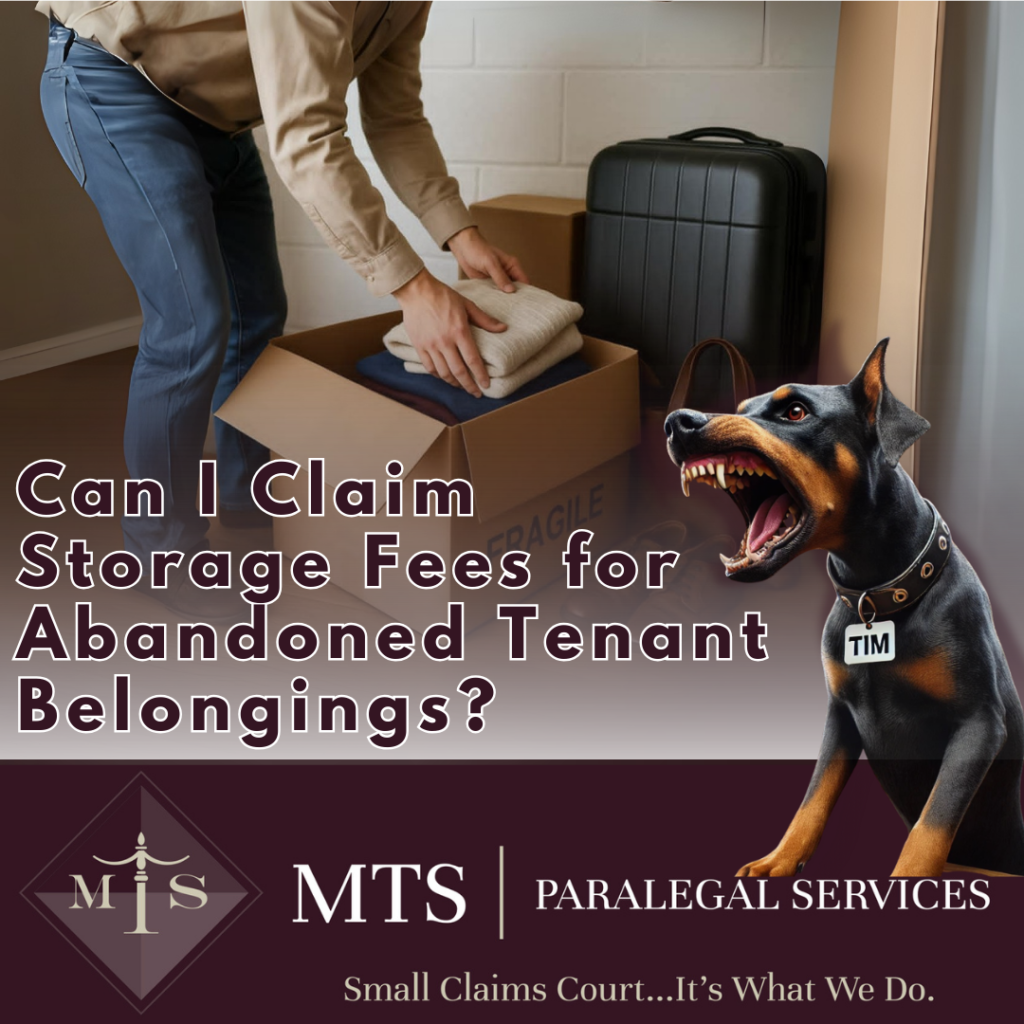
Can I Claim Storage Fees for Abandoned Tenant Belongings?
Landlord Rights Regarding Abandoned Belongings
When a tenant vacates a rental unit—either voluntarily or through eviction—they sometimes leave behind personal belongings. This can create significant inconvenience and expense for the landlord. A common question arises: Can a landlord in Ontario claim storage fees for the tenant’s abandoned belongings?
This issue is addressed under Ontario’s Residential Tenancies Act, 2006 (RTA), which governs landlord and tenant obligations. While landlords do have some discretion in dealing with unclaimed possessions, there are strict rules that must be followed before attempting to recover storage-related costs.
When a Tenant Leaves Without Notice or After Eviction
There is a legal distinction between a tenant who vacates voluntarily and one who has been lawfully evicted by the Landlord and Tenant Board (LTB).
- If the tenant is evicted by order of the LTB, the landlord must hold the tenant’s belongings for 72 hours. During this period, the landlord must make the items available to the tenant, at the tenant’s request and at a reasonable time.
- If the tenant leaves without notice or abandonment is suspected, the landlord must be cautious. It is not enough to presume the tenant has abandoned the property. The landlord should make reasonable attempts to confirm the abandonment, such as contacting the tenant, checking for signs of return, and confirming with utility providers or neighbours. Acting prematurely can expose the landlord to liability for wrongful disposal.
Claiming Storage Fees: What Is Permissible?
Under the RTA, landlords are not automatically entitled to storage fees unless such fees were specifically outlined in a written tenancy agreement. Even if costs were incurred storing or moving abandoned property, the legislation does not guarantee reimbursement unless pursued through the appropriate legal forum.
In certain cases, landlords may commence an action in Small Claims Court to recover damages associated with storage, removal, or disposal of items left behind. To succeed in this type of claim, the landlord must demonstrate:
- That the tenant clearly abandoned the property
- That the landlord took reasonable and lawful steps to safeguard and eventually dispose of the belongings
- That actual costs were incurred and documented (e.g., invoices from storage companies or movers)
- That efforts were made to mitigate the expenses
Landlords considering this route should be aware that as of October 1, 2025, Ontario’s Small Claims Court will increase its jurisdiction to $50,000, expanding the scope of recoverable claims related to tenancies.
Best Practices for Landlords
To reduce liability and increase the chances of recovery, landlords should adhere to the following best practices:
- Document the date of tenant departure and any communication attempts made
- Take photographs or inventory of items left behind
- Provide written notice (where possible) to the tenant’s last known address
- Retain receipts and logs related to any storage or removal activity
- Seek legal guidance before discarding property or initiating legal claims
Storage-related disputes often arise in situations where tenants leave without proper notice or skip rent. In such instances, combining a Small Claims Court action for arrears and storage-related losses may be advisable.
Landlords unsure about their rights regarding abandoned belongings or storage fee recovery should contact Tim at MTS Paralegal Services. Based in Kitchener, Tim offers strategic legal support for tenancy-related disputes, from proper handling of abandoned property to claims in Small Claims Court.
Call (226) 444-4882 to consult with Tim at MTS Paralegal Services and protect your interests under Ontario’s tenancy laws.
This content does not constitute legal advice. For up-to-date guidance or legal advice specific to your situation, please contact MTS Paralegal Services Professional Corporation or call (226) 444-4882.
